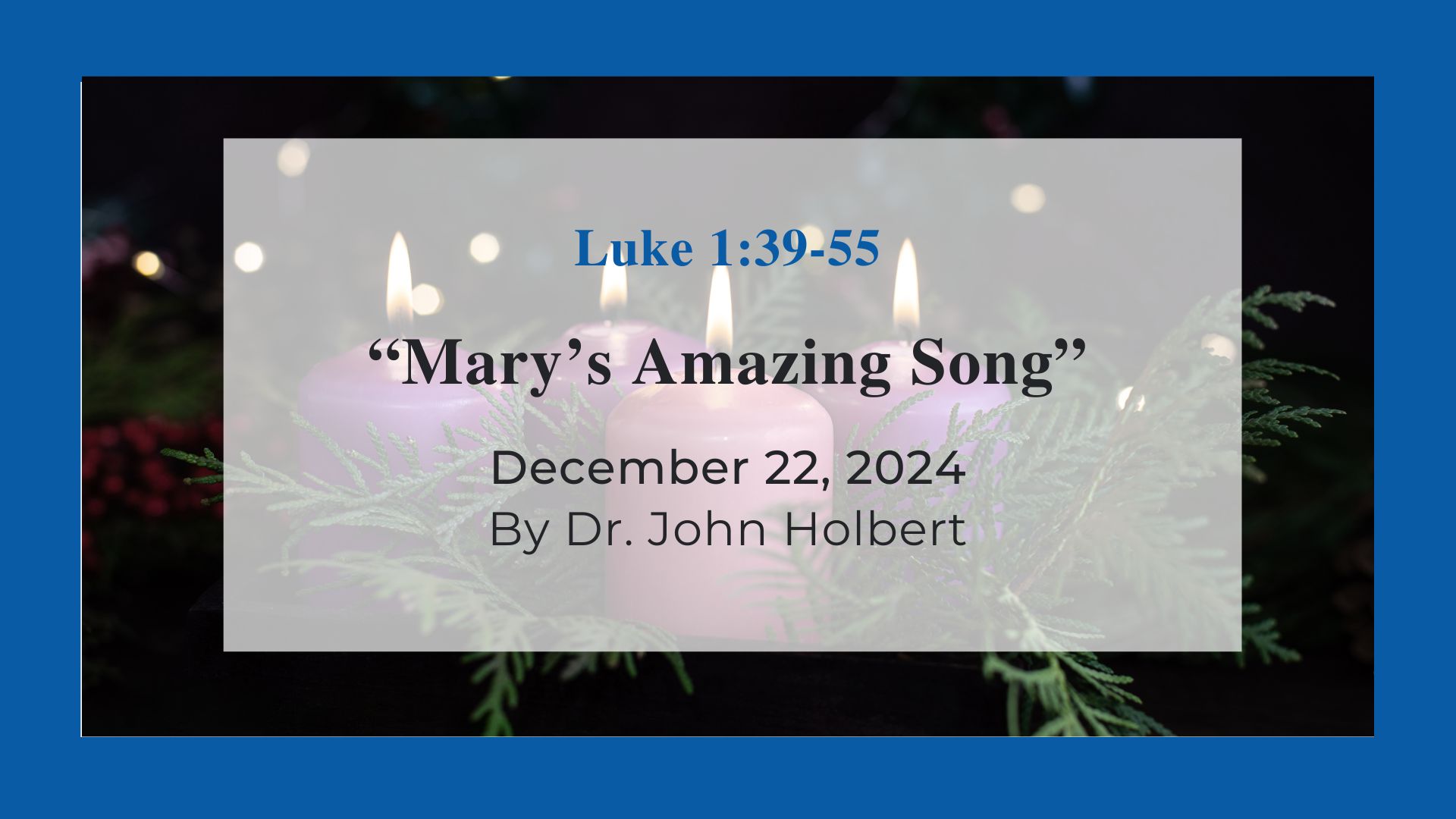Mary's Amazing Song - Reflections on Luke 1:39-55 for Advent4, YearC
by John Holbert on Saturday, November 30, 2024

Many a preacher has come to the Fourth Sunday of Advent with at least two mindsets: on the one hand, she may be thinking, “At last! Christmas is almost here, and my job will finally be slowing down—choir concert over, children’s pageant done, only the midnight carol service stands between me and my much-needed vacation!” On the other hand, she may be wondering, “Is anyone going to pay any attention to one more sermon about Mary and Elizabeth, since the church is full of very part-time visitors, buoyed by the regulars who have heard it all countless times before?” Since everyone within earshot is anxious to get home to a house full of carefully wrapped gifts, the scent of eggnog punch, and endless carols on the Echo Dot, what can I say that will capture those ears enough to pay a bit of attention to the old tale one more time?
Fortunately for all of us, Luke tells the story with vividness, chock full of wonder and surprise, replete with the riches of the Gospel. I would suggest a sharp telling of the story, allowing the outlines and the details to arrest the congregants long enough to keep them with you and perhaps making it possible for them to make it well past the narthex with the story still bubbling in their hearts. Let me give you a brief example of how the story can serve as the central part of the sermon. After all, it is the story itself that has energized and empowered hearers through the many centuries of its life; why not give to it a fuller hearing this Sunday?
After Mary’s odd confrontation with the angel Gabriel, and after his astonishing announcement that she was going to have a baby, despite the fact that she and Joseph were not yet married, not to mention that she was still a virgin, with the possible scandal that could wreck her young life, she rushed off to a small village in Judea, some few miles south of her town of Nazareth, to visit the home of Zechariah and his wife, Elizabeth, kin of hers, who, though she was somewhat older than a normal pregnant women normally was at the time, was nonetheless with child. Mary greeted her as was appropriate, and immediately Elizabeth’s baby leaped in her womb, just like the old story of Rebecca’s children jostling in her womb in the book of Genesis, a story well-known to all Jewish believers.
Not only did the baby leap, Elizabeth shouted in a very loud voice, “You are blessed among women, and the fruit of your womb is also blessed. How do I deserve to have the mother of my Lord visit me? Why, no sooner had you greeted me, when my baby leaped with gladness inside of me! How blessed is the woman who has believed, because the things said to her by the Lord will be fulfilled!”
Now, there was a biblical mouthful! Mary wondered to herself, “How did she know I was pregnant? Just how am I blessed among women, since I am barely a woman at all? Just how do I believe what I was told, and how does she know what I was told anyway? What does she imagine will be fulfilled?” But outloud, Mary spoke quite differently than that, uttering words that will echo down the centuries. “My soul extols the Lord; my spirit rejoices in God, my savior. God has considered the lowliness of God’s servant, and now all generations will call me blessed. God shows unbreakable love to those who worship generation after generation. God has pulled the mighty from their thrones; has exalted the lowly; has filled the hungry with good things, but has sent the rich away empty. God has taken Israel by the hand, remembering unbreakable love to Abraham and his descendants forever, just as promised to our mothers and fathers.”
Mary’s astonishing speech, her famous “Magnificat” (from the Latin translation of the first word of the song—Luke 1:47) moves in stages that can readily be seen: from lowliness to exaltation (Luke 1:46-49), to a more general statement of God’s mercy (“unbreakable love” in my translation, based on Hebrew chesed, eleeo in Greek), to all those who worship God (1:50), to a recital of the past and present reversals that God has performed (1:51-53), and finally to a demonstration of how God’s unbreakable love is being shown now to Israel in fulfillment of God’s promise to Abraham (1:54-55). The child she carries will be the sign of all of these things, and the presentation of his ministry in the succeeding chapters of Luke’s Gospel will fulfill all these statements and more. The babe soon to be born in Bethlehem’s manger will be the savior of the world, as Luke will now try to make plain to all. And Mary’s song is the beginning of all that Luke promises and all that Luke promises and all that God offers us in hope.
